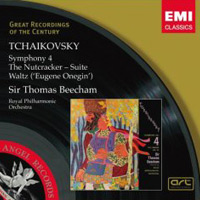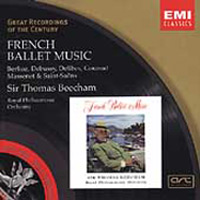 |
| June 1, 2007 Bountiful Beecham
Of course the term "new" might be said to be misplaced here, as these recordings not only go back quite some time (Beecham, after all, died in 1961), but have been in almost constant circulation, some of them having appeared in two or three earlier CD editions. But there is some material here that had not been available on CD before, and all of it benefits significantly from the latest transfers in EMI’s "Great Recordings of the Century" series, for which the company’s "Abbey Road Technology" is enhanced by the Prism SNS system. In handsome contrast to the hard, glaring acoustic of some re-re-reissues, the sound treatment here may be called luscious -- but luscious in Beecham’s own manner, which means the sound quality, like the performances themselves, is tempered by an unself-conscious elegance that keeps it from getting syrupy.
When it came to those "lollipops" (defined, Beecham liked to remind us, as "a sweet at the end of a stick"), Sir Thomas was in a very special class. In his day, of course, all the great conductors -- Weingartner, Toscanini, Mengelberg, et al. -- included Strauss waltzes, Auber overtures, Massenet suites and other gems of "the light genre" in their formal concerts, just as the old Greek theater used to follow a tragedy with a comedy or satyr-play. For whatever reason (and there is surely no acceptable one!), this category has virtually disappeared from today’s concert life, and when it does get a nod here and there it is all too often from someone who thinks lighter music can be sight-read. Beecham and his contemporaries certainly understood the folly of such an attitude. Just as theater people will tell you that it is more daunting to prepare a comedy than a straight drama or tragedy, it might be said that lighter music demands even greater preparation than "serious" symphonies, simply because the lighter fare is less substantial and in its case the performance itself is everything. The Onegin Waltz, aglow in good stereophonic sound, and the entire Nutcracker Suite, in opulent mono from 1954 (recorded not by EMI, but by Philips, during the brief period of Sir Thomas’s contract with American Columbia), are gloriously fresh as well as substantial because Beecham treated them with the same level of care that went into his performance of the Fourth Symphony. The Symphony, by the way, is also monophonic, though recorded in the fall of 1957, but you’d hardly notice, because the sound quality, excellent to begin with, is better than ever in Ian Jones’s splendid new transfer. The symphony dances; the dances are symphonic; and yet nothing on this remarkable disc is out of its own element. That’s how the Beecham magic worked.
España is the only 78rpm recording on the CD, and the only one with the LPO. Beecham had founded that orchestra only seven years earlier, and it was then at its very peak, soon to be affected, however, by WWII, which had begun a few weeks before the sessions for this recording. The remainder of this disc gives us Sir Thomas’s last orchestra, the Royal Philharmonic, in its own glory days, and the band known in Beecham’s time as l’Orchestre National de la Radiodiffusion Française, which has in our time become l’Orchestre National de France. The booklet cover, in fact, reproduces the original cover of the monophonic LP that comprised the three performances by the latter orchestra: Fauré’s Dolly Suite, the Overture to Chabrier’s pseudo-Wagnerian opera Gwendoline, and Bizet’s Carmen Suite. The Bizet was not recorded as a suite, but taken from Sir Thomas’s recording of the opera itself; both it and the Fauré suite are in stereo here, as they were on an earlier CD, while the blazing Gwendoline Overture, in its first CD appearance, is in very effective mono. No one has made a more effective case for this seldom heard overture, and it’s not very likely anyone ever will: it is Beecham at his amazing, transformative best. The RPO contributions include two stereophonic tracks from the well remembered "Lollipops" collection taped early in 1957 -- downright stunning accounts of Saint-Saëns’s Rouet d’Omphale and still more Chabrier, the Joyeuse Marche -- and two more tracks of Bizet, in mono: the rousing concert overture Patrie! and, as almost certainly the least familiar item in the entire collection, the last of the four movements of the symphonic suite Roma. All of these are prime examples of the unique amalgam of charm, power, subtlety, and overall imaginativeness that made Beecham Beecham, and if placing these two Bizet rarities side-by-side serves to emphasize the impression that both are built on the same theme (only given different rhythmic stress), well, even that works beautifully in the present context. ...Richard Freed
Ultra Audio is part of the SoundStage! Network. |
 For many of us -- though perhaps
not for those who came in late -- Sir Thomas Beecham’s name on a recording is enough
to certify it as a "keeper," as EMI has reminded us splendidly with two new
Beecham collections: a Tchaikovsky program with Sir Thomas’s own Royal Philharmonic
Orchestra on 3 80015 2, and a collection of French Orchestral Music involving that
orchestra and two others on 3 79985 2.
For many of us -- though perhaps
not for those who came in late -- Sir Thomas Beecham’s name on a recording is enough
to certify it as a "keeper," as EMI has reminded us splendidly with two new
Beecham collections: a Tchaikovsky program with Sir Thomas’s own Royal Philharmonic
Orchestra on 3 80015 2, and a collection of French Orchestral Music involving that
orchestra and two others on 3 79985 2.  What all this comes down to, you
might say, is the supposedly simple term charm. It was second nature to Beecham,
and because he never had to fake it, it could be in his hands an effective element in
performing a work of utter seriousness -- here Tchaikovsky’s Fourth Symphony, with
its structure and details exceptionally clear, yet impelled by the grand, sweeping
momentum the work demands if it is to be at all effective -- as well as one of his famous
"lollipops," such as the deliciously served Act II Waltz from Evgeny Onegin on
the same CD.
What all this comes down to, you
might say, is the supposedly simple term charm. It was second nature to Beecham,
and because he never had to fake it, it could be in his hands an effective element in
performing a work of utter seriousness -- here Tchaikovsky’s Fourth Symphony, with
its structure and details exceptionally clear, yet impelled by the grand, sweeping
momentum the work demands if it is to be at all effective -- as well as one of his famous
"lollipops," such as the deliciously served Act II Waltz from Evgeny Onegin on
the same CD.  The transfer engineer for the
French collection was Andrew Walter, and his work is no less remarkably successful than
Jones’s. It might be said, in fact, that the most remarkable track on either disc in
this respect is the one of Beecham’s celebrated 1939 recording of Chabrier’s España
with the London Philharmonic. When it was first issued, the following year, there was some
grousing about a six-minute piece’s being spread over the two sides of a 12" 78
when most other recordings of the work fit comfortably on a more economical 10", but
the sound was outstanding for its day, revealing details of a performance on which no one
with working ears would have dreamed of placing a price. Andrew Walter’s transfer is
little short of miraculous: the date of the recording, as a colleague has remarked, simply
looks like a mistake when you hear the tambourine, the free-wheeling trombones, and the
amazing basses that come in at about 4 min. 10 sec.
The transfer engineer for the
French collection was Andrew Walter, and his work is no less remarkably successful than
Jones’s. It might be said, in fact, that the most remarkable track on either disc in
this respect is the one of Beecham’s celebrated 1939 recording of Chabrier’s España
with the London Philharmonic. When it was first issued, the following year, there was some
grousing about a six-minute piece’s being spread over the two sides of a 12" 78
when most other recordings of the work fit comfortably on a more economical 10", but
the sound was outstanding for its day, revealing details of a performance on which no one
with working ears would have dreamed of placing a price. Andrew Walter’s transfer is
little short of miraculous: the date of the recording, as a colleague has remarked, simply
looks like a mistake when you hear the tambourine, the free-wheeling trombones, and the
amazing basses that come in at about 4 min. 10 sec.